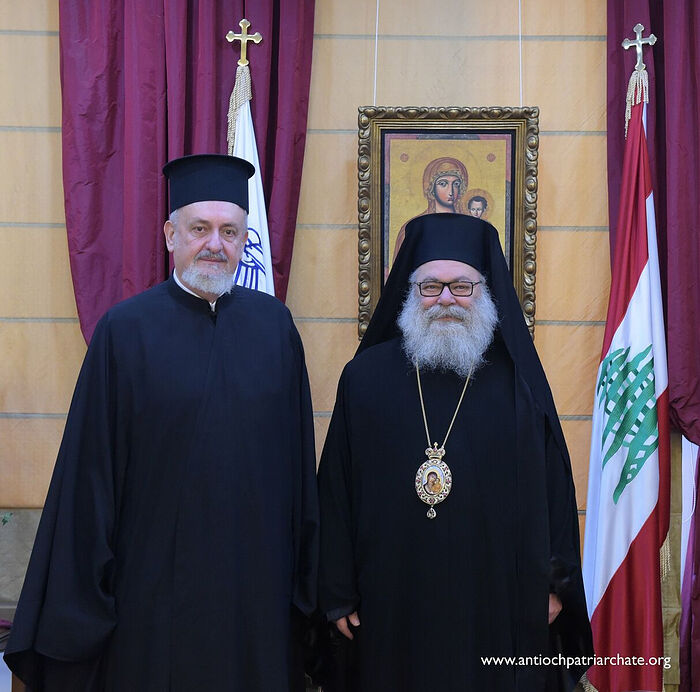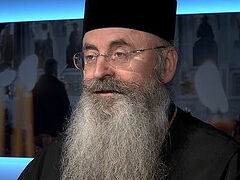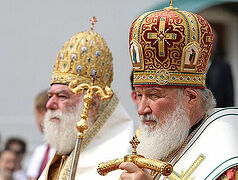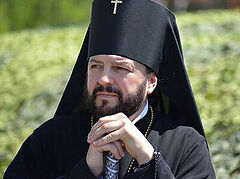 Patriarch John of Antioch with Metropolitan Emmanuel of Chalcedon of the Patriarchate of Constantionple
Patriarch John of Antioch with Metropolitan Emmanuel of Chalcedon of the Patriarchate of Constantionple
It was widely reported and well known that the Patriarchs of Constantinople and Alexandria had plans to convene a council of the primates of the “ancient Churches” of Constantinople, Alexandria, Antioch, Jerusalem, and Cyprus to deal with the Russian Synod’s decision to establish an African Exarchate.
Some outlets spoke about this as a revival of the ancient Pentarchy, with the Church of Cyprus taking fifth place, which will punish the Russian Church (one Greek hierarch has even explicitly called for the Russian Church to be deprived of its autocephaly).
The groundwork for this was clearly laid by Patriarch Theodoros of Alexandria in his “Encyclical to the Holy Clergy and Pious People of Our Ancient Patriarchate of Alexandria and All Africa,” where he implicitly presents a tiered concept of autocephaly, where Constantinople, Alexandria, Antioch, and Jerusalem were always responsible for solving problems in the Church, while Constantinople held a place of primacy in the East. The Church of Cyprus is also mentioned as an ancient Church, though clearly with lower standing than the Patriarchates.
Later Patriarchates, including the Moscow Patriarchate as his letter indicates, are presented as possessing less authority, as practically an aberration, where new states used secular power to achieve autocephaly status for their Churches, granted self-sacrificially by Constantinople.
Metropolitan Gregory of Cameroon of the Patriarchate of Alexandria then began visiting the primates of the ancient Churches to inform them of what has been happening in Africa, and Metropolitan Emmanuel of Chalcedon has begun visiting primates to invite them to this gathering of the primates of the ancient Churches-new Pentarchy.
Both hierarchs visited His Beatitude Patriarch John X of Antioch in the past week, and it’s interesting to compare the differences in the Antiochian and Constantinople press releases about these visits.
Though the first Antiochian statement follows the typical pattern: “The hierarchs met in a warm and friendly atmosphere and discussed matters of mutual interest, etc.,” the language seems to imply that Constantinople has already lowered its expectations for this revival of the Pentarchy that will condemn the actions of the Russian Church, with the accompanying canonical sanctions.
Following the visit of Met. Emmanuel on Saturday, February 12, Antioch reported:
His Beatitude John X, Patriarch of Antioch and All the East, received His Eminence Metropolitan Emmanuel of Chalcedon, envoy of Ecumenical Patriarch Bartholomew I, at the patriarchal residence in Balamand. The Elder Metropolitan carried an invitation to participate in the meeting of the four Apostolic Patriarchates, proposed to be held before the Great Lent and Holy Week in Constantinople, to discuss the issues facing the Orthodox Church. The meeting raised the discussion about the historical relations uniting the Churches of Antioch and Constantinople, as well as the overall emerging issues.
There are three interesting points here:
-
The gathering of primates is simply called a “meeting” here, not a “council” or “synaxis.” While this choice of wording may not mean anything specific, it is more reminiscent of the meeting of the primates of Alexandria, Antioch, Jerusalem, and Cyprus in April 2019, or the fraternal meeting in Amman in February 2020, both of which were consultative gatherings, rather than councils that would promulgate authoritative decisions.
-
The proposed meeting will include the Patriarchates of Constantinople, Alexandria, Antioch, and Jerusalem, but not the Church of Cyprus. This could mean that Constantinople and Alexandria are backing down from the tiered system of autocephalous Churches that they have been implicitly presenting.
-
There is no indication that Pat. John accepted the invitation.
The next day, Constantinople issued its own statement about Met. Emmanuel’s visit to Pat. John:
The two ancient Patriarchates, which have maintained brotherly relations for centuries, reiterated their desire to jointly contribute to the consolidation of Pan-Orthodox unity through another Synaxis of the primates of the senior Patriarchates in the near future.
Here, the stronger term, “Synaxis of the primates” is used, and the wording gives more of an impression that Pat. John accepted the invitation to attend.
And again the next day, Antioch issued another statement, this time about the visit of Metropolitans Gregory of Cameroon and John of Zambia from the Church of Alexandria:
The Metropolitans briefed the Patriarch on the developments that the patriarchate has witnessed after the creation of the African Exarchate by the Russian Church. The gathering also discussed the meeting of the patriarchs of the four apostolic churches proposed to be held by the Patriarchate of Constantinople before the Holy Week.
His Beatitude reiterated to the Alexandrian delegation what he had told the envoy of the Ecumenical Patriarch, Elder Metropolitan of Chalcedon, Emmanuel, that the Holy Antiochian Synod would meet soon to confer the developments in the Orthodox Church and take an appropriate stance on them.
The Antiochian Church speaks again of a “meeting” of the primates of only the four ancient Patriarchates, and here it is emphasized that Pat. John will not make any unilateral decision about whether to attend the gathering, but will leave the matter to the Synod of the Antiochian Patriarchate.
It’s also noteworthy that the statement emphasizes that Pat. John had specifically told Met. Emmanuel that the matter would be left up to the Synod, whereas the Constantinople statement implies that Pat. John already agreed to attend the Patriarchal gathering.
Thus, based on the Antiochian statements, it can be reasonably suggested that Constantinople has lowered its initial expectations for a council of a revived Pentarchy that will bring the hammer down upon the Russian Church. Perhaps they came to understand that even were all the invited Patriarchs to attend, such a council, with its implicit system of tiered autocephalies, would never be accepted by the Church at large.




